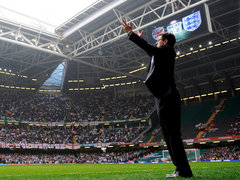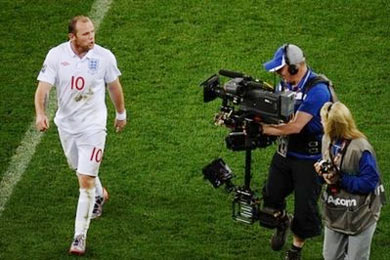By Andrew Warshaw in Manchester
March 31 – England will never produce a winning national team unless they stop concentrating on short-term club success and adopt the German model of youth development.
That was the stark warning issued today by German general manager Oliver Bierhoff who acknowledged that the Champions League had become more important than the World Cup for many players and that England had lost their fighting spirit.
Bierhoff was among the speakers at the Soccerex conference here and pulled no punches when explaining why Germany completely changed its philosophy following years of success at the club level in the 1990s when its teams regularly reached European finals – just as England’s do now.
“It all goes back to 2000 when we had to face the brutal fact that Germany played ugly football and was not successful,” said Bierhoff.
“In Germany the national team is an icon, it’s the property of the people so we needed the players to be able to bond together.
“We realised we had to change and clear rules were defined.”
These rules meant far greater emphasis on youth with the formation of a programme of performance academies that are now the bedrock of German football, with 52 percent of players in the top two divisions being home-grown with an average age of 25.
At least 12 players in every under-16 team must be eligible to play for the national team while 1,800 players aged between 12 and 14 are trained in such performance centres, all sobering statistics for those running, for instance, the game in England.
Christian Siefert, chief executive of the Bundesliga, joined Bierhoff on the panel and explained that it was vital to persuade all clubs to buy into the long-term value of youth development.
“If clubs like Bayern Munich had not accepted this project it would not have been possible,” he said.
“You cannot under-estimate in 2000 the importance of the real decision-makers at club level agreeing we had to change something.
“Too often short-term success is used as an excuse not to develop a long-term plan because that is less glamourous and less sexy.”
Bombarded by questions relating to England’s ongoing club-versus-country issue, Bierhoff underlined the importance of the national manager being a citizen of that country.
“It definitely helped us,” he said.
“If the coach is from the country then he thinks about what is happening in the country and he is not just a project manager.”
Asked to define England’s weakness when the two countries met at the World Cup last year – the Germans won 4-1 in the second round – Beirhoff said there was a clear difference between the two teams, and not only on the pitch.
 “[Fabio] Capello (pictured) is famous coach but there was not a lot of communication and team spirit from England,” said Beirhoff.
“[Fabio] Capello (pictured) is famous coach but there was not a lot of communication and team spirit from England,” said Beirhoff.
“We had a strong team spirit and discipline.
“England have quality players but they weren’t communicating.”
In a wide-ranging address to Soccerex delegates, Bierhoff, who oversees the development of the national game in Germany after a distinguished career as a player, outlined the improvements made in the set-up of the German national side, whose young exciting team reached the semi-finals in South Africa.
He acknowledged that the Champions League had become more important than the World Cup for many players, a criticism often levelled at the Premier League.
“I think if you are a player now, at a big club, the Champions League is the one you want to win,” Bierhoff said.
“”Winning the domestic title is important, but the Champions League is the crown, the pinnacle.”
Bierhoff said that he, together with the German coaching staff, had tried to change that philosophy and move away from a win-at-all-costs club mentality.
As a result, German teams may not be as strong as those in England but the national side, because of recent restructuring, is light years ahead on and off the field.
“We don’t pay our players as much as they earn in their clubs but it is very important to create something special around the national team,” said Bierhoff, who skippered Germany in 2000 when there were a mere 45 players to choose from.
“Nowadays we have a far wider choice of players.
“We needed to change the atmosphere, especially after the 2004 European Championship in Portugal.
“It had seemed to the people that the players didn’t want to play for the team, that it was not fun.
“There is a danger that you lose the support of the man in the street.
“So we helped them develop responsibilities to help them grow as people because we wanted them to respect not only their fellow players but the staff who worked with them.
“We did not want them to behave like spoilt brats.”
Contact the writer of this story at zib.l1734867040labto1734867040ofdlr1734867040owedi1734867040sni@w1734867040ahsra1734867040w.wer1734867040dna1734867040

